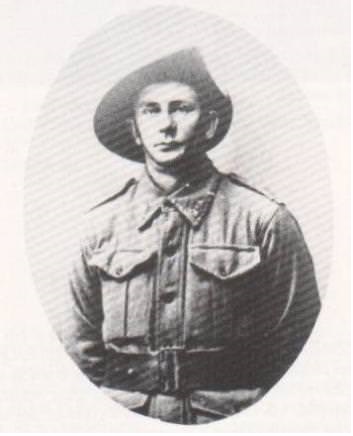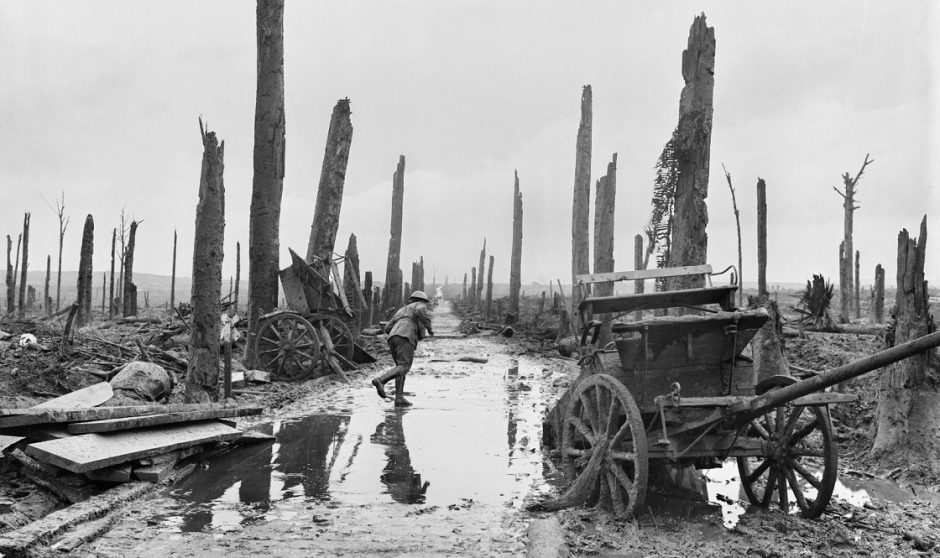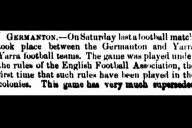The story of the “Soccer” Anzac from Minmi who became a hero on the way to war (and never made it back)
Soccer has trouble remembering itself. This failing leaves it open to accusations of foreignness and unbelonging, accusations levelled from without and often complacently accepted from within. One of the more curious moments of amnesia in the game is its failure to acknowledge the soccer Anzacs – the soccer players who fought in both World Wars.” – Ian Syson, Soccer and Anzac: Forgetting and Remembering in Western Sydney
Shoot Farken published Ian Syson’s sobering observation six years ago. The past decade has seen indefatigable Ian, with some success, get the forgotten story of the sacrifices made by Australia’s association footballers in war out to the wider football community. He shone a light on how the enlistments in WW1 were so great that it brought a burgeoning football code to its knees. Encouragingly, some state football federations have acknowledged the players who fought and died in war. But compared to other Australia’s other football codes who dominate the Anzac Day narrative, this important story is buried in the media landscape with some of the blame laying squarely with gatekeepers of the code.
Over the years I have gladly assisted Ian in the painstaking investigative research that is required to accurately track down the players who went to war and their fates. When researching players from the Hunter Valley, the true cradle of Australian football, I uncovered the remarkable story of local Newcastle favourite “Bull” Jennings and his claim to friends back home that he had been offered a contract with Chelsea. Unfortunately “Bull” received a bullet wound to the leg on the Western Front and his football career was cruelly cut short.
In the “Bull” Jennings piece I wrote the following – “Football, unlike in other parts of Australia, was mainstream and part of the fabric of Hunter life. The game was mainly played by the working class sons of parents and grandparents who migrated to Australia and set up proud mining communities. They enlisted in their droves in 1915 and 1916. Many served on the Western Front in the 34th Battalion “Maitland’s Own” and 35th Battalion “Newcastles’ Own.” Over 75% of the 500 players who enlisted from the playing ranks of the NDBFA were born in Australia; in stark contrast to Sydney, and especially Melbourne, where the football playing enlistees were predominantly British migrants.”
So, the reason I am writing this piece is not just to refocus our minds on Anzac Day, on those who served and fell, but to also tell you an amazing and very poignant story of an Australian-born soccer player who never made it back. It’s bad enough trying to comprehend the horrendous number of men who senselessly died in WW1, but when we personalise the stories we really get the full impact of these very human tragedies.
This is the story of Private Joseph Bilbie.

Joseph Bilbie was born in Minmi on October 17, 1888. His mother Mary Ann Bilbie (nee Russell) was also born in Minmi in 1851. His father James Bilbie was born in Somerset, England, in 1827 and passed away in 1907.
Before World War 1 you would’ve been hard pressed to find a more passionate advocate for the game of football in the Hunter region than Joseph “Joker” Gilbie. Not only was he one of the best players for the Minmi Wanderers, he was also the secretary of the club. In October 1913 his tireless services were recognised at the club’s end of season function.
“At the conclusion of supper, the tables were cleared, preparatory to making a presentation to Mr. Joseph Bilbie. Mr. S. Wells, jun., said that he was pleased to see such a large gathering present to witness the termination of the football season, as far as the Minmi Club was concerned. He had a very pleasant duty to perform, that of making a presentation of a gold medal, on behalf of the club, to Mr. J. Bilbie, hon. secretary. Mr. Bilbie’s one desire was to see the British game of football prosper, not only locally, but throughout the district.” – Newcastle Morning Herald and Miners’ Advocate
Two months later he also received a gold medal from the Minmi Public School in recognition of services rendered as the school’s coach. It was due to his efforts that the school had given such a good account during the season.
“Mr. Bilbie, in responding, said that words failed to express the action that prompted the school team to reward him with such a nice present; He was never happier than when he was amongst them in their practice games, and his services would always be at their disposal. He did not know that he had done, anything that should merit such recognition.” – Newcastle Morning Herald and Miners’ Advocate
On January 25, 1916, Joseph Bilbie enlisted with D Company of “Maitland’s Own” 34th Battalion. He arrived in England on the “Hororata” on June 23 and left for the Western Front on November 21 already a hero.
In February, 1917, news of Joseph’s brave action in London finally reached the delighted and proud mining and football community of Minmi.
“MINMI SOLDIER’S BRAVERY. By the latest mail from London, Mrs. J. Bilbie of Minmi, mother of Private Joseph (“Joker”) Bilbie, has received a certificate conferred by the British Admiralty on her son for bravery, for saving the life of a young lad named J. Ward. Private Bilbie, and some more of the Australian soldiers, were on leave and were crossing over one of the Thames’ bridges, when a cry rang out. Private Bilbie, after removing some of his uniform, dived off the bridge and saved the lad, who was in the water. When Private Bilbie brought the lad to the shore he was given a great ovation, and many who witnessed the brave action shook him by the hand. Prior to enlisting, Private Bilbie was an engine driver at the Minmi Colliery, was prominent in the Engine drivers and Fire-men’s Union and was also one of the best Soccer-football fullbacks in the district. He was the organiser and captain of the Minmi Wanderers’ Football Club, who, in four seasons, won three sets of medals and cups, and was only defeated by one goal to nil in the semi-final in the other year. Private Bilbie was also manager and director of the Minmi Schoolboys’ Football Club. The lads at the school were delighted when they heard of the brave action of their old friend and supporter, “Joker,” as he was better known in football and cricket circles. The Minmi Wanderers’ Football Club and supporters are also delighted at their old comrade’s action. Mrs. Bilbie, who is an aged and invalid lady, has had many congratulations for the way her son has carried out his duty abroad.” – Newcastle Morning Herald and Miners’ Advocate
On October 12, 1917, the men of 34th Battalion and 35th Battalion, including Bilbie and what would have been many of his fellow Hunter Valley footballers, found themselves in the boggy hell that was the Battle Of Passchendaele. The casualty rates from this disastrous operation are still mind numbing to comprehend. From a battalion of around 500 men, over 50% were killed or wounded in the 34th and only 90 men from Newcastle’s 35th made it out unscathed. Joseph Bilbie received a gunshot wound to the buttock on October 13. He was transferred to England where he spent a month in hospital, thankful that unlike some of his compatriots he didn’t suffer a fate like drowning in a mud filled crater or worse.
Private Joseph Bilbie returned to France in February 1918 and rejoined the 34th Battalion. He was sent back into action on March 16 at Villers Bretennoux. On April 5 he was wounded for a second time. This time our Thames River hero did not recover.
Shortly after his death, Joseph’s grief stricken mother received the following letter from Chaplain A. H. Cullen, of the 1st South African General Hospital, France.
“I am writing to acquaint you with the sad news of the passing away of your gallant son, on the evening of the 8th of April. During his very short stay in the hospital he was very dangerously ill, and his condition was almost hopeless from the very first. He was wounded in the right buttock, and, unfortunately, his wound had a gas infection, to which must be traced the ultimate cause of his death. He was very patient while he was with us, and everything possible was done to make him comfortable. He was laid to rest in the local cemetery at Abbeville, and the prayers on the little card enclosed were used at his burial service.”
On April 27, 1918, the devastated Minmi football community paid their respects to their fallen hero in the local paper.
Newcastle Herald And Miner’s Advocate, April 27, 1918
Lest we forget Joseph “Joker” Bilbie and all the other soldiers who never made it back home.
















